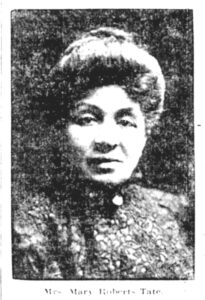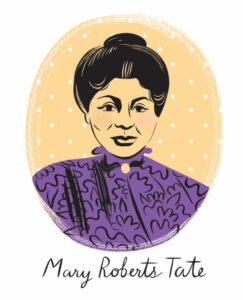Mary Roberts Tate
By Sophia Ward Brewer, 2020
Life Dates: b. Unknown, d. 1914
Full Name: Mary Roberts Tate
Birthplace: Unknown
Tags: Civil Rights, Community Organizations, Suffrage, Women’s Clubs
Until her death in 1914, this now virtually unknown African American reform advocate gave voice to African American women both locally and nationally, on stages and in newspapers. By 1894, when Mary Roberts Tate was 45, she and a few other African American women in Grand Rapids started the Married Ladies Nineteenth Century Club, a social and political group dedicated to the uplift of the race. This groundbreaking women’s club was formed two years before the National Association of Colored Women’s Clubs organized, and fifteen years before the National Association for the Advancement of Colored People (NAACP).
Mary Roberts Tate was a local beautician and business owner, who also served as organizer, vice-president, and principal lecturer of the Michigan Federation of Colored Women’s Clubs. In September of 1900, she led the state Federation in its petition to President McKinley for restitution to an African American widow after her husband had been killed by a mob when he was appointed a postmaster in South Carolina. Fearless, Tate used her voice to enlighten people about the plight and progress of African Americans and about women’s rights at a time when most black women were largely unseen and unheard in public life
In a speech captured by the Grand Rapids Herald in 1907, “North Unfair to the Negro,” Tate condemns the attitudes of white people who were kowtowing to the South during what we now call the Jim Crow era: “The north has grown silent and is holding hands off in matters pertaining to our welfare, and dislikes, or fear to take up our cause, no matter what injustices we suffer.” More locally, in 1906, Mary Roberts Tate had represented her club and community in a show of solidarity and respect for women’s suffrage movements, by speaking at a memorial tribute to Susan B. Anthony at the prestigious Ladies Literary Club.
Mary Roberts Tate and other African American women during this period demonstrated that they could shoulder the burdens of their race while they also carried the burdens of womanhood. As she traveled, spoke, and advocated for the rights of all, Tate seemed to understand the weight behind Sojourner Truth’s famous words, “Ain’t I a Woman?”
Women like Mary Roberts Tate who were counted on but often discounted during the struggle for the vote. Tate died in 1914 before universal suffrage was achieved.

Mary Roberts Tate, 1906
To the Public Pulse, Grand Rapids Press, October 17, 1902
Editor: I have been a tax payer for the past 19 years, and I want to enlighten white citizens as to the colored tax payers of Grand Rapids. We have 200 families and 68 pay taxes on property worth over $100,000. I will say that our boys and girls are as wide awake and as enterprising as you will find anywhere, and the rule is that their morals are good. As to the new engine house, I think the good citizens of Grand Rapids would just as soon a black man should save their property and perhaps their families from fire as a white man. So give us the engine house. Mrs. M. R. Tate [excerpted]
Sources
This biography can also be found in the February 2020 issue of the Grand Rapids Women’s LifeStyle magazine.

